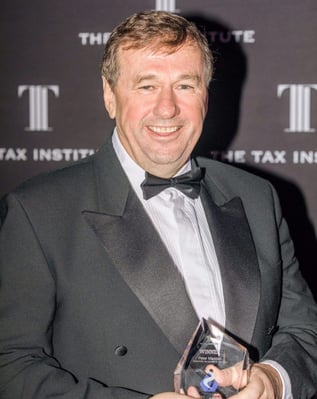Peter Madden is a partner and national leader, international tax, with KPMG in Sydney and is The Tax Institute’s 2017 Chartered Tax Adviser of the Year.
We asked Peter about his career and life.
Member’s name
Peter Madden CTA
Company
KPMG
State
New South Wales
Member since
1983
What initially led you to a career in tax?
I studied commerce and law at the University of New South Wales and it was fortuitous that Peat Marwick at the time offered careers in specialist tax. This required both my legal training and my accounting training, so I thought it was a good combination.
I joined the tax division of Peat Marwick in 1983. It was probably the leading tax practice at a time when the accounting firms were just beginning to do more tax work. That’s where I’ve stayed, with Peat Marwick evolving into KPMG, although tax has changed since then, as have the roles.
The basics are the same, but the focus areas have changed quite dramatically over 34 years.
What do you enjoy most about your work as a tax professional?
Getting to understand the more difficult parts of the tax law, like how double tax treaties operate vis à vis the domestic Tax Acts.
My role as an international tax partner enables me to get into some of the more difficult issues and resolve them. And that involves working with the tax authorities to come up with a reasonable outcome for new legislation or existing law.
I need to understand the law to apply it to specific situations, avoid the pitfalls that people can fall into, and alert people to their exposure.
What are the biggest challenges in your work?
There are still grey areas and different views on the application of the law.
Another challenge is how to resolve and mitigate risk. You just can’t leave a risk unidentified. While some clients may be prepared to take specified risks, most really want to achieve resolution and certainty.
You’ve been a member of The Tax Institute since 1983. What has been the main impact of Institute membership for you?
Certainly in the early years, going to the seminars and annual intensive conferences was a big part of my work. And reading the articles that focus on specific issues.
I’ve also delivered quite a few presentations and written a few articles, which I’ve enjoyed. Every two years, I present to my tax discussion group, and have shared those articles with The Tax Institute. This has involved investigating specific areas and getting to the bottom of them. That’s helped me in my work.
What did it mean to you to win the Chartered Tax Adviser of the Year award?
I was really happy to win the award. It felt like I’d achieved something — that I was getting recognition for all the work I’ve done over many years. It was great to be acknowledged after such a long time. You keep plugging away, but you don’t really know whether people appreciate it or not.
Do you have advice for someone beginning a career in tax?
Tax is a very rewarding career, but you’ve got to be good at it. You have to understand the law, and there are building blocks to work on. You have to thoroughly understand the way the Tax Act works in cases. I’ve seen too many people try to skirt around that and just go into particular narrow niches. Instead, you have to have a broad base of knowledge that you will always rely on to progress.
Tax is challenging, but rewarding. You build a skill base that very few people have. Because it takes a long time to build that skill base, it’s not something that you can do for a couple of years and then move on. It’s a long-term, skilled profession.
What are your main personal interests (outside law and tax)?
I have a farm that I’m very interested in. I have four children all over the world, so I try to track them down in their various professions. I also have a holiday house on the south coast, which I like to get to as much as I can. I’d like to play more golf and things like that, but there never seems to be enough time.
However, I really enjoy my career. It gives me personal satisfaction, getting to a level where I can influence policy, advise clients, help people and provide specialist knowledge. It’s a good thing to do.
This article was first published in the August issue of The Tax Institute’s member-only journal, Taxation in Australia.









